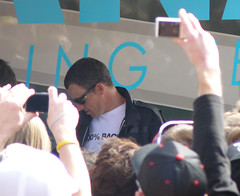[Review written on 07/30/2004 at 12:10:39 PM]

L.A. Confidentiel, les secrets de Lance Armstrong, is a thick trade paperback with a yellow cover, a a timely color given the coincidence with the Tour de France, which crowds the many Parisian bookstores. In the tome, Pierre Ballestrer and David Walsh build a well documented suggestive scenario. And quite surprisingly the scandalistic tones one would expect in this kind of work are all but absent.
Similar suggestions have been present in the French press throughout the Tour: Lance is the ultimate American cyborg, the result of advanced medicine and clever media manipulation. He is the perfect product of the New American Century, as false as Bush's military records and the perfect face for the US world supremacy: as the good Texan president triumphs on evil in the war on terror, the Texan cyclist triumphs on cancer, and espouses Bush's cause of offering a role model for the new generation, a drug-free victory of willpower over adversity. And it might be just a coincidence in this era of disinformation and other patriot acts that the Armstrong lawyer team has chosen to prevent its US publication.
On the last points, the authors beg to differ. They deconstruct Armstrong's own books, painting an image of a good if not great athlete with immense ambition and a ruthless agent who knows the media and has assured the services of an effective team of lawyers, as the negotiation and divorce with Cofidis in 1997 seem to indicate. But the intent is not mudslinging, but rather to build what they think is a more plausible rationale for Lance ascent in the Champs Elysées of cycling.
The argument of the book can be simply articulated in a few points:
- Lance's cancer has probably been caused by his previous substance abuse, possibly corticosteroids
- It is highly unlikely that his real exams were checked in the weeks preceding the discovery of his testicle cancer, as he would have resulted positive simply due too his illness. Suspicions about the US Postal routine exams being altered if not completely fake are raised later about the French anti doping checks after the 2000 Tour.
- After his comeback to competition for US Postal, Lance starts working with doctors known for their involvement with other teams which made strong use of hematocrit-enhancing drugs (Ferrari and Aramendi) as it emerged from several sources and trials. The use of controlled substances is also suggested by his former masseuse, Emma O'Reilly
- As a likely result of these practices, the US Postal goes from noncompetitive to dominant in just one season, and Lance wins (so far) 6 Tours in a row.


No comments:
Post a Comment